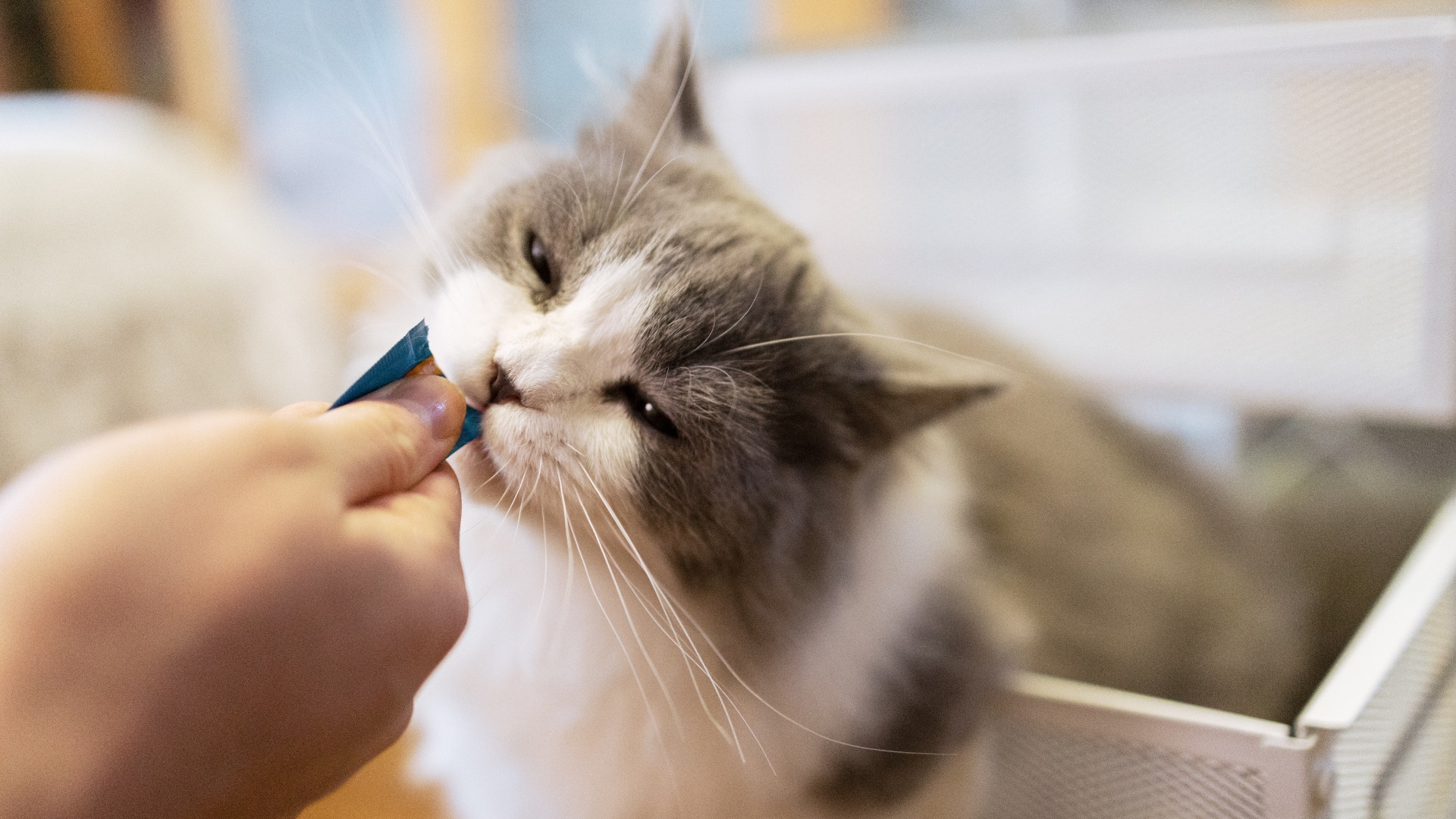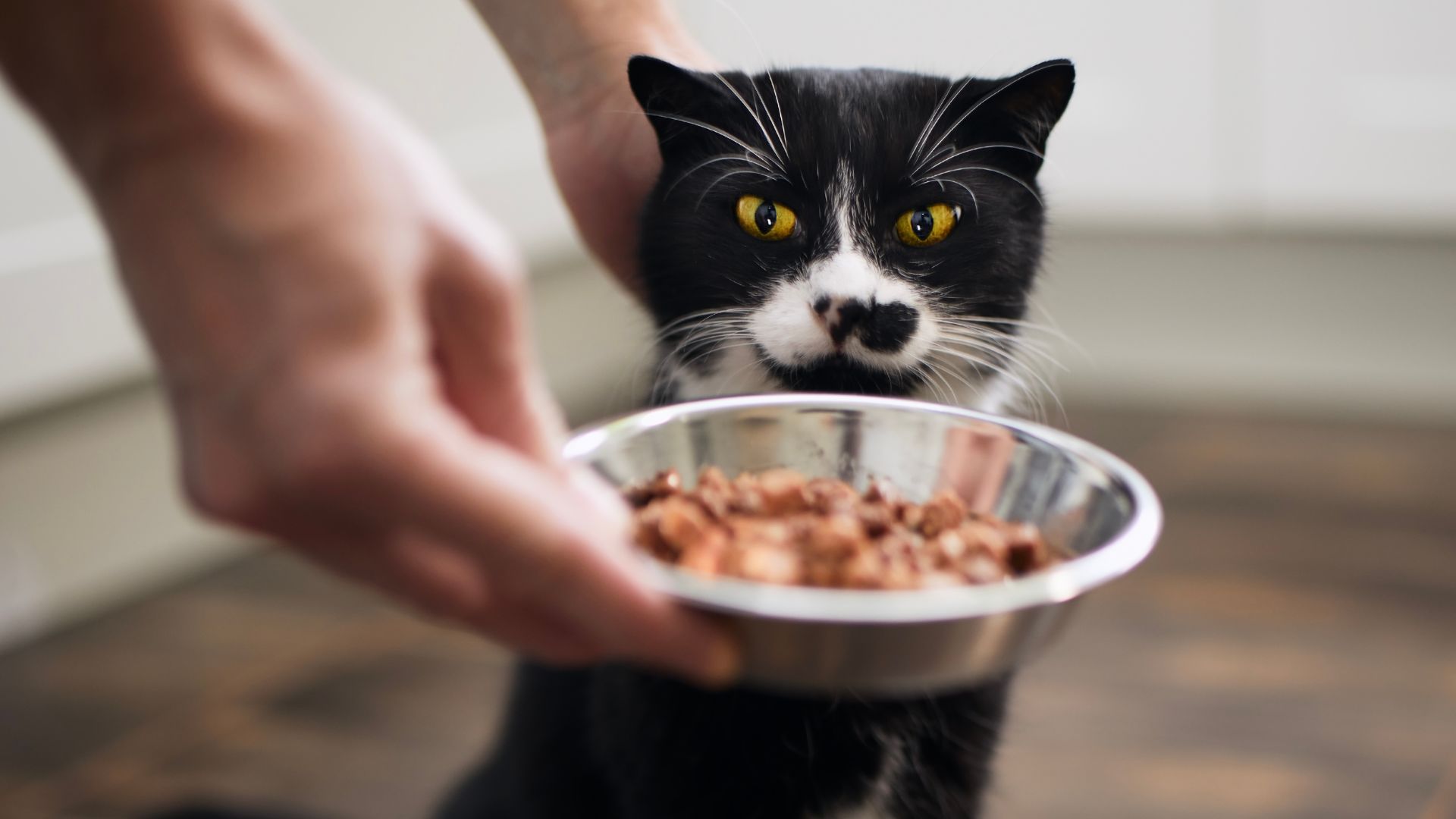How long can cats go without food? When to be concerned if your cat stops eating
Our expert vet answers, ‘How long can cats go without food?’
Get the best advice, tips and top tech for your beloved Pets
You are now subscribed
Your newsletter sign-up was successful
If your feline friend isn’t eating, you might wonder, ‘How long can cats go without food?’ This behavior can be very worrying as a pet parent, especially when you don’t know the reason behind it.
There are various reasons why your cat might turn their nose up at their bowl — even if you’ve invested in the best dry cat food or the best wet cat food. They could be feeling anxious or suffering from a medical condition, but sometimes it can be difficult to work out exactly what the problem is.
If you’re concerned about your cat not eating, we’ve got you covered. We spoke to expert vet Dr. Joanna Woodnutt about the most common reasons and how long they can go without food. She’s also advised when you should talk to a professional about it.
How long can cats go without food?
If you’re as much of a foodie as we are, the thought of missing a meal most likely leaves you feeling horrified. But your feline furkid has a different relationship to food and can survive for up to two weeks without their kibble as long as they have access to plenty of clean water. Without this, they would be unlikely to survive for more than two to three days.
That being said, just because your cat could technically survive for that long without eating, it doesn’t mean that they won’t become seriously unwell and malnourished. Just like us humans, food is where cats get all the necessary vitamins and minerals they need to thrive, so going without is far from ideal.
According to Dr. Woodnutt, there isn’t a definitive length of time cats can go without food. "A lot depends on other factors – how well hydrated they are, how well nourished they were before they went without, and if they have other diseases complicating matters," she explains.
"Our domestic cats are descended from wildcats and have evolved to eat several small meals a day. In an otherwise healthy cat, missing one meal should prompt close attention, but not necessarily a trip to the vets. Missing more than this would definitely be a cause for concern, and should warrant a vet visit for investigations."
Get the best advice, tips and top tech for your beloved Pets
Why has my cat stopped eating?
While some pet parents have the issue of their cat eating too fast and too much, others have the problem of their cat stopping eating altogether. It’s true that not eating can signal a health problem, but there are other more benign reasons why your kitty may have gone off their chow. The most common include:
- A recent vaccination or new medication
- Anxiety or stress brought on by a change in routine
- New food
- A slower metabolism - this is common in older cats
- Digestive issues
- Dental/tooth pain
- Kidney disease
- An obstruction/indigestion/constipation
- Pancreatitis
- Boredom/fussiness
Cat behavior problems are complex, so there could be any number of reasons why your moggy has stopped frequenting their food bowl and while some of them are indeed a cause for concern, others will likely settle down as quickly as they came. Which of course begs the question, when is your cat’s lack of appetite serious enough to warrant a trip to the vet?
How long should I wait to see my vet?

This is often a tricky one for pet parents. It’s the kitty equivalent of the human problem of how sick you feel you need to be before you call your doctor to request a check-up.
A lot of us worry about bothering our vet with something that could turn out to be nothing but trust us when we say that your vet would rather you pop in and have it turn out to be a minor issue than not go and have your kitty quickly go downhill.
"If a cat skips a meal, it’s important to look at their overall health," Dr. Woodnutt advises. "If they’re young and otherwise healthy, you can leave them a couple of hours and then offer something else. If they can still be tempted to eat, that’s a good thing.
If a healthy adult cat refuses more than one meal, I’d recommend a vet visit. Of course, if your cat is very young (under six months), elderly (over 10), or has another condition, they’ll need to visit the vet sooner."
Tricks to get your cat to eat
"If your vet has ruled out underlying problems, or you are aware of an underlying problem like kidney disease but still need to get your cat to eat from time to time, there are some things that can help," says Dr. Woodnutt.
Here are few of her top tips:
- Heat up their food. Cats hunt and eat very recently-dead prey, so warmer food is more natural and stimulates their sense of smell, which is important to how they approach and eat food. Don’t forget it shouldn’t be too hot – if you microwave it, stir and let it cool a little. Another option is to add a tiny amount of boiling water and then let it cool.
- Try wet food. If your cat is usually on dry food, wet food may be a good option to get them eating again as it’s smellier and more like their natural diet
- Try fish food. Unless your cat has medical issues preventing this, flaky fish food sprinkled over their meal can help inspire them to eat. It’s smelly stuff! You want one that’s made from fish.
- Don’t pressure them. Cats are contrary beings, and they don’t take stress well. Try not to stand over your cat when they’re eating, find them somewhere peaceful where they can’t be watched or bullied by other cats, too.
Hepatic Lipidosis in cats
"If an overweight cat stops eating, their body mobilises their fat reserves," explains Dr. Woodnutt. "Unfortunately, too much fat coming out of storage can overwhelm the liver, causing a severe disease called hepatic lipidosis, which can be life-threatening.
If your cat stops eating and is overweight, you should get them seen by a vet after just one or two skipped meals. If the underlying cause of the inappetence can’t be found, they may need tube feeding until they voluntarily eat again."
Kitten not eating? Our vet explains the causes and how to help them. Or if you’re questioning, ‘How much should I feed my cat?’ we reveal the answer in this feature.

Dr Joanna Woodnutt qualified as a vet from the University of Nottingham where she then went on to practice companion animal medicine in the Midlands. She really took to the consulting side of things and helping clients with medical problems such as dermatology, behavior and nutrition - anything that involved helping clients understand their pets better.

Kathryn is a freelance writer who has been a member of the PetsRadar family since it launched in 2020. Highly experienced in her field, she's driven by a desire to provide pet parents with accurate, timely, and informative content that enables them to provide their fur friends with everything they need to thrive.
Kathryn works closely with vets and trainers to ensure all articles offer the most up-to-date information across a range of pet-related fields, from insights into health and behavior issues to tips on products and training.
When she’s not busy crafting the perfect sentence for her features, buying guides and news pieces, she can be found hanging out with her family (which includes one super sassy cat and a kitten), drinking copious amounts of Jasmine tea and reading all the books.
She has written for a range of publications, including Fit&Well, Top Ten Reviews, LiveScience, Goodto, and Product Hunt.
- Megan MilsteadStaff Writer

